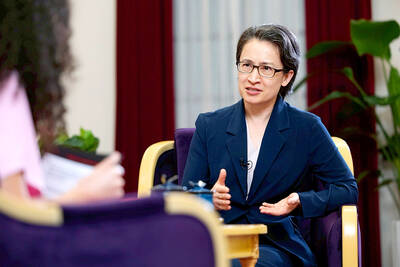A recent survey by Shih Hsin University has given media literacy in Taiwan a minimal grade and found considerable room for improvement in the public’s ability to detect embedded advertising while also struggling to accurately judge advertisements for medicines.
This year’s score of 62.9 out of 100 was 3.4 points higher than last year’s, but with the survey’s margin of error operating a plus or minus of 3.1 percentage points, the score actually amounts to barely a passing grade, Lin Cheng-yu (林承宇), an assistant professor with the university’s School of Lifelong Learning, said on Friday.
Although media literacy education has been promoted in Taiwan, the effort has focused on schools, which has helped lead to an improvement in literacy among younger generations, but not among the general population, Lin said.
The survey found a gap in media literacy between urban and rural residents because of levels of education and access to information.
City residents tend to score higher because they have access to more information, while people in rural areas tend to follow the media “blindly,” Lin said.
Many so-called health drinks that are popular in more rural areas, for example, are advertised as products that will make people feel energized and are good for their health. In fact, they contain alcohol or drugs that should only be dispensed by licensed pharmacists, Lin said.
The Council of Labor Affairs has found that many workplace accidents were related to the consumption of these types of health drinks that contain alcohol, he said.
The public also still needs to improve its ability to identify embedded advertising, Lin said, because certain commercials are presented as talk shows, especially for dieting-related products, appearance or sexual performance enhancement.
A talk show targeted at a female audience, for example, might invite a popular makeup artist to introduce makeup products, such as BB creams where the camera will “accidentally” focus on the brand name and the show’s presenter might ask something like “where can we buy this?” Lin said.
If viewers have the ability to analyze and discern what is going on, they will understand that the program is an advertisement, Lin said. He warned people to think twice before purchasing these items.
Lin said the purpose of media literacy education is to equip the public with the ability to “make distinctions” before they are “persuaded.” This skill will help audiences understand the limitations of news reports and realize that the point of commercials is to sell products, he added.
The nationwide survey was conducted by the university’s College of Journalism and Communications from May 21 to June 18. It questioned 1,000 people on their use of the media from platforms including newspapers, magazines, radio broadcasts, TV and the Internet.

Temperatures in northern Taiwan are forecast to reach as high as 30°C today, as an ongoing northeasterly seasonal wind system weakens, the Central Weather Administration (CWA) said. CWA forecaster Tseng Chao-cheng (曾昭誠) said yesterday that with the seasonal wind system weakening, warmer easterly winds would boost the temperature today. Daytime temperatures in northern Taiwan and Yilan County are expected to range from 28°C to 30°C today, up about 3°C from yesterday, Tseng said. According to the CWA, temperature highs in central and southern Taiwan could stay stable. However, the weather is expected to turn cooler starting tonight as the northeasterly wind system strengthens again

The Ministry of Foreign Affairs (MOFA) yesterday expressed “grave concerns” after Singaporean Prime Minister Lawrence Wong (黃循財) reiterated the city-state’s opposition to “Taiwanese independence” during a meeting with Chinese Premier Li Qiang (李強). In Singapore on Saturday, Wong and Li discussed cross-strait developments, the Singaporean Ministry of Foreign Affairs said in a statement. “Prime Minister Wong reiterated that Singapore has a clear and consistent ‘one China’ policy and is opposed to Taiwan independence,” it said. MOFA responded that it is an objective fact and a common understanding shared by many that the Republic of China (ROC) is an independent, sovereign nation, with world-leading

COOLING OFF: Temperatures are expected to fall to lows of about 20°C on Sunday and possibly 18°C to 19°C next week, following a wave of northeasterly winds on Friday The Central Weather Administration (CWA) on Sunday forecast more rain and cooler temperatures for northern Taiwan this week, with the mercury dropping to lows of 18°C, as another wave of northeasterly winds sweeps across the country. The current northeasterly winds would continue to affect Taiwan through today, with precipitation peaking today, bringing increased rainfall to windward areas, CWA forecaster Liu Pei-teng (劉沛滕) said. The weather system would weaken slightly tomorrow before another, stronger wave arrives on Friday, lasting into next week, Liu said. From yesterday to today, northern Taiwan can expect cool, wet weather, with lows of 22°C to 23°C in most areas,

DEFENDING FREEDOM: Taiwanese love peace and helping others, and hope to be a positive force in the world, Vice President Hsiao Bi-khim told ‘Weltspiegel’ Taiwan is making every effort to prevent war in the face of China’s hybrid coercion tactics and military threats, Vice President Hsiao Bi-khim (蕭美琴) said in an interview with German public broadcaster ARD’s program Weltspiegel that aired on Monday. Taiwan is not seeking provocation or intending to disrupt international order, but “must possess the capacity for self-defense,” a news release issued by the Presidential Office yesterday quoted her as saying. Taiwan is closely watching not only the increasing scope and frequency of Chinese military exercises around the nation, but also Beijing’s hybrid and cognitive warfare tactics, including manipulating public opinion, fostering